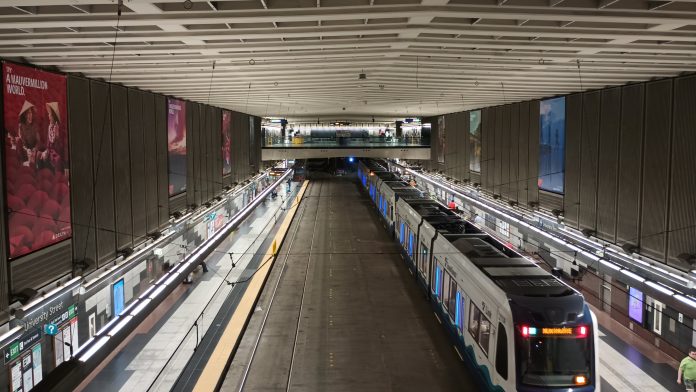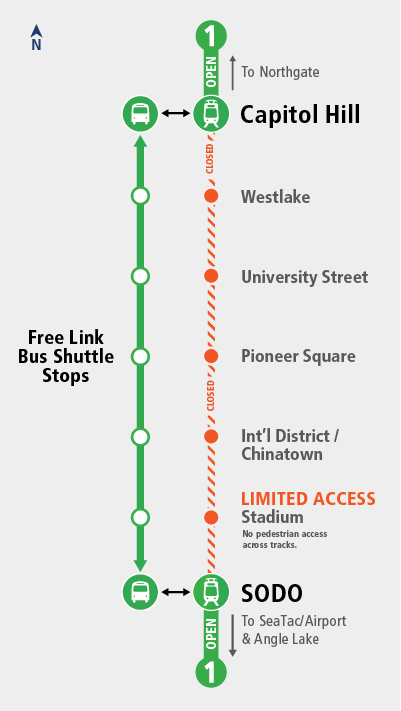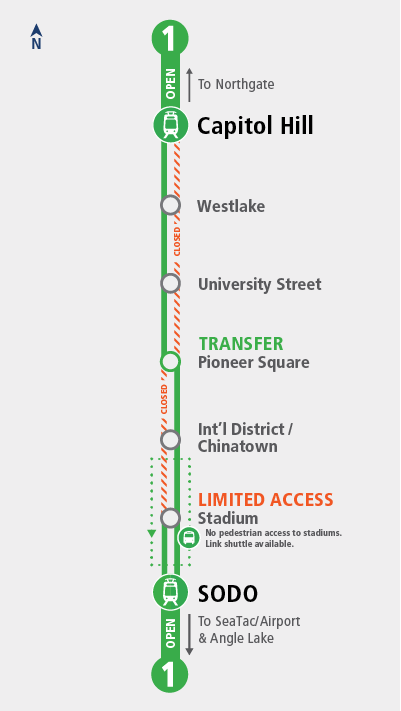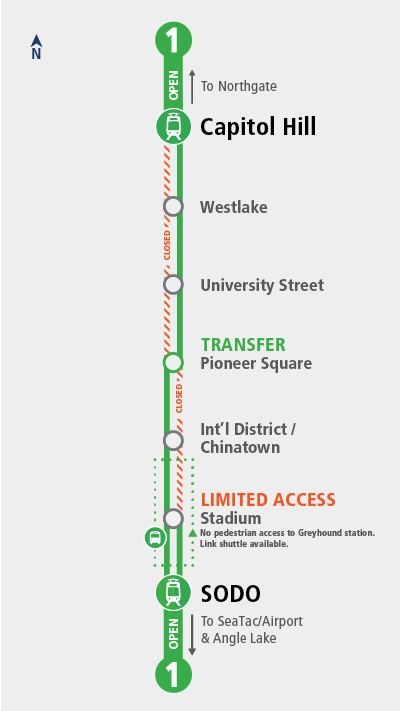
Light rail won’t operate between SoDo and Capitol Hill on August 12 and 13, with a service gap bus bridge instead. A series of single-tracking disruptions will follow.
More planned service disruptions are coming to the Link light rail. On Thursday, Sound Transit CEO Julie Timm announced upcoming service disruptions to address track quality issues and other maintenance issues.
“Link riders should be prepared for two upcoming planned service disruptions in August and into September as the agency undertakes essential maintenance work to ensure the state of good repair of the light rail system,” Timm said.
The work isn’t a surprise. Agency staff noted in March that a logjam of maintenance projects were on the horizon. The latest round of work and service disruption will be focused on a faulty section of track near Stadium station.
“Royal Brougham needs to be reconstructed based on underlying soil conditions causing the elevation of the alignment to sink and the depressed track area increases high water buildup that causes us to have slow performance in these areas,” Timm explained. “It needs to be completed during the summer season, not the rainy season.”
Earlier this year, flooding of the tracks at Royal Brougham forced an emergency repair at the crossing. This caused severe service disruptions and a period of single-tracking operations to address the problem. A permanent fix will involve replacement of the track and drainage improvements, thereby allowing the agency to lift a 10 mph slow order and operate trains at normal speeds through the section.
Sound Transit also plans to use the service disruption to maximize resolution to other outstanding maintenance items. Timm laid out quite a sum of projects, including:
- Investigation of emergency backup power systems in the downtown transit tunnel;
- Replacement of track near International District/Chinatown station;
- Replacement of track plinths near the downtown transit tunnel;
- Repair of rail signals and equipment in the downtown transit tunnel;
- Installation of rail signals and equipment related to the East Link tie-in; and
- Removing scaffolding that was put in place as part of the Westlake station roof puncture.
The rider impact won’t be insignificant. The first service disruption runs from August 12 through August 19, and over the eight days, there will be three phases of service disruptions.

From August 12 through August 13, Link service will be suspended between Capitol Hill and SoDo. As a result, trains will run Capitol Hill-Northgate and SoDo-Angle Lake at 15-minute frequencies. A free shuttle bus will connect riders between Capitol Hill and SoDo with stops near the closed downtown tunnel stations. Shuttle bus service will be every 10 minutes.

From August 14 through August 15, service will be split into two segments with a forced transfer at Pioneer Square station. Trains will run through the downtown transit tunnel on a single track. As a result, service will run Pioneer Square-Angle Lake and Pioneer Square-Northgate at 11- to 12-minute frequencies, the agency said. (Update: Riders report 20-minute frequencies in actuality, as of August 15.) Trains will dwell at the Pioneer Square station platforms for several minutes to allow for connections. Riders will have to reach the mezzanine level and go back down to the opposite platform to accomplish the transfers. Additionally, riders wanting to reach the stadiums will be best served doing so at International District/Chinatown or SoDo stations due to the closure of S Royal Brougham Way.

Finally from August 16 through August 19, the service disruption will mimic the August 14 through August 15 one. The only difference is the that single-tracking operations will swap.
A lot of pain for the latter two parts of this service disruption could have been avoided if Sound Transit had retained the center platform constructed at Pioneer Square station for the Connect 2020 works, as The Urbanist argued in January of 2020. That’s because the center platform allowed for a direct, level transfer between trains using the station and reduced dwell time — an all-around win for operations and riders. This isn’t the first time either that planned maintenance works since 2020 could have benefited from retention of the center platform. Unfortunately, agency staff and the Sound Transit Board of Directors opted against retaining the platform even for limited cases like this, leading to its removal two years ago.
A longer second service disruption period will run from August 21 through September 17. Timm said it will be focused on reconstructing platform tiles at Othello and Rainier Beach stations just like last year at Columbia City station. Single-tracking operations will be put into service in around the stations in the Rainier Valley with 12-minute frequencies systemwide to facilitate the work, the agency said in July.
On August 21, Sound Transit announced it had revised the plan and would maintain 15-minute frequencies during the Rainier Valley tile work. “Our Operations team needed to update our headways earlier today across the system to operate the trains every 15 minutes. Please note the update as my earlier email stated 12 minutes headways. We apologize for any inconvenience this may cause,” agency spokesperson Abel Pacheco said in a a statement.
Moving into the late summer, Link riders are going to see some unavoidable pain but Sound Transit’s approach is much more organized and less painful than earlier forays into planned service disruptions.
Editor’s note: This article was updated with subsequent information from Sound Transit that revised service frequency plans.
Stephen is a professional urban planner in Puget Sound with a passion for sustainable, livable, and diverse cities. He is especially interested in how policies, regulations, and programs can promote positive outcomes for communities. With stints in great cities like Bellingham and Cork, Stephen currently lives in Seattle. He primarily covers land use and transportation issues and has been with The Urbanist since 2014.

